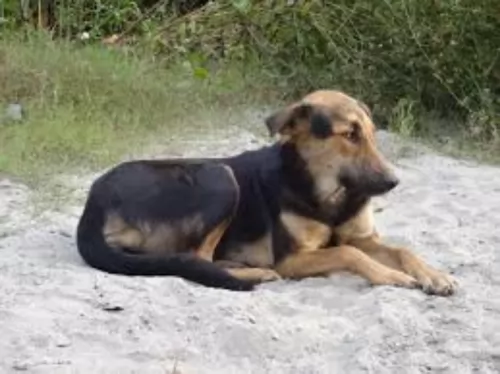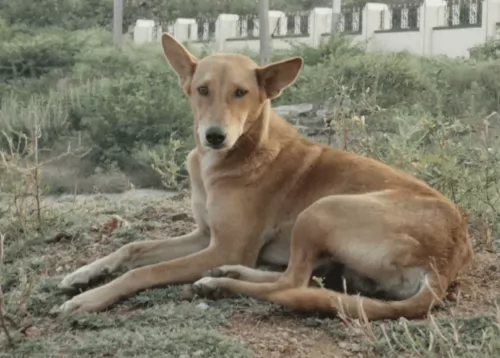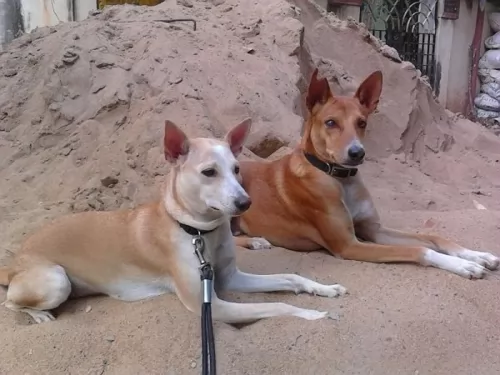 Petzlover
Petzlover Galgo Espanol is originated from Spain but Indian Pariah Dog is originated from India. Both Galgo Espanol and Indian Pariah Dog are having almost same height. Both Galgo Espanol and Indian Pariah Dog are having almost same weight. Both Galgo Espanol and Indian Pariah Dog has almost same life span. Both Galgo Espanol and Indian Pariah Dog has almost same litter size. Both Galgo Espanol and Indian Pariah Dog requires Low Maintenance.
Galgo Espanol is originated from Spain but Indian Pariah Dog is originated from India. Both Galgo Espanol and Indian Pariah Dog are having almost same height. Both Galgo Espanol and Indian Pariah Dog are having almost same weight. Both Galgo Espanol and Indian Pariah Dog has almost same life span. Both Galgo Espanol and Indian Pariah Dog has almost same litter size. Both Galgo Espanol and Indian Pariah Dog requires Low Maintenance.
 Galgo Espanol means Spanish with galgo meaning greyhound, thus a Spanish Greyhound. This breed is ancient with their roots in perhaps the English greyhound and others in the sighthound family. They are much like the greyhound in that they are laid back, calm, gentle and quiet, unless they are competing on the local track. Like the greyhound they are shy and reserved; great with kids and other pets. And of course, they love cats.
Galgo Espanol means Spanish with galgo meaning greyhound, thus a Spanish Greyhound. This breed is ancient with their roots in perhaps the English greyhound and others in the sighthound family. They are much like the greyhound in that they are laid back, calm, gentle and quiet, unless they are competing on the local track. Like the greyhound they are shy and reserved; great with kids and other pets. And of course, they love cats.
There are dogs like the Galgo referred to in writing by the ancient Celts and Romans. One author, Arrian, had his own Galgos and used them when hunting. The breed flourished in the second half of the Middle Ages in Spain and well into the 8th century. When the Christians regained control of the Iberian Peninsula, they did away with the hunter old forms of hunting and introduced a new form with hounds that made the Galgo the pride of the aristocracy and not in the homes of the ordinary people. Arrian claim to two types of dogs, the smooth and rough coated.
Muslim and Chrisitan Kings kept Galgo Espanols. In all probability the Saluke and Galgo were crossbred at this time. It was illegal to kill a Galgo and in 1081, the Mayor of Cartuario of Slonza left his Galgo in his will to Diego Citid. Dogs seen in painting from the 12th century look just like dogs of this breed who can be seen today.
It is believed that when the Galgo was developed, it was in the midsection of Spain or the Castillian plains. They ruled the interior of the country while the bloodhound ruled the exterior. The 18th and 19th centuries saw very little change in the breed. However, in the 20th century, there was cross breeding with the English greyhound that produced a leaner, faster and powerful track racing dog. The results was a faster dog without the long distance stamina of the pure Galgo. For this reason, the breeders returned to breeding the pure professional racing dog.
The sport of racing the Galgo earns Spain around sixty million dollars per year. They train anywhere from three to four thousand of the Galgos every year for Open Field Coursing Championships. Still, there no longer is any cross breeding between the Greyhound and the Galgo. The current coursing programs feature a hare that is much hardier and difficult to pursue so the stamina of the old Galgo Espanol is desired. In Castile, where these games are played, the landscape is open with large fields that requires that the hare travels far greater distances. This means that the stamina of the original Galgo Espanol is needed.
When not racing the Galgos have become great house pets. They have a reputation as gentle dogs that are docile and quiet, with good health. This reputation is well earned. They are also successful show dogs in Europe much more than the states. This is perhaps because they are really rare outside of Spain. They are not recognized by the United Kennel Club nor the American Kennel Club.
 The Indian pariah, known also as the Indi-dog or In-dog, is an ancient dog breed common throughout India as well as Bangladesh.
The Indian pariah, known also as the Indi-dog or In-dog, is an ancient dog breed common throughout India as well as Bangladesh.
A breed standard does exist for the dog with the Indian Kennel Club and the dog has also been recognized by the Primitive and Aboriginal Dog Society.
A great dog enthusiast, Indian environmentalist, M Krishnan, has written about this ancient dog breed, telling about its wonderful temperament and its hardy constitution.
 Obviously the Galgos looks a lot like the Greyhound, but in some very important ways they are very different. The rear of the Galgos is higher than the front and their muscle are flatter. They are built for endurance while the Greyhound is built for speed. The Galgos is a lighter, smaller dog with larger ear on a long head. They have long tails and their chests are not deep like the Greyhounds.
Obviously the Galgos looks a lot like the Greyhound, but in some very important ways they are very different. The rear of the Galgos is higher than the front and their muscle are flatter. They are built for endurance while the Greyhound is built for speed. The Galgos is a lighter, smaller dog with larger ear on a long head. They have long tails and their chests are not deep like the Greyhounds.
The Galgo comes in smooth and rough coats and a variety of colors. The rough coat protects dogs that are in climates colder than the ones in Spain and also keeps them from injuring their skin while running. The colors include brindle, black, golden, toasted, cinnamon, yellow, red, white, white with patches, or any color as long as they have a white forehead and muzzle.
 The Indian Pariah dog is a medium sized, lanky looking dog with the males and females standing at 46cm to 64cm in height and weighing roughly between 15 to 30kg.
The Indian Pariah dog is a medium sized, lanky looking dog with the males and females standing at 46cm to 64cm in height and weighing roughly between 15 to 30kg.
These dogs aren't big eaters so they tend to be lean and muscular. This is a double coated dog with the hair being coarse and fawn in colour or reddish brown.
He has fairly large, erect ears and brown eyes. He has a long tail which is held down but when he is excited it is held high and over the back, curling at the tip. There is sometimes white around the face and chest.
The Pariah dog is a social dog but he is somewhat timid, even though they make excellent watch dogs, being territorial around their human family. Being territorial, he can have an aggressive side to him so it is wise to have him trained and socialized as then he is obedient and capable of getting on well with children in the home.
These dogs are also very intelligent and therefore easily trained. He is an active dog and likes to be kept busy, wanting to be participating in the activities of his human family.
 They are good with children, but you need to be careful no one gets knocked down or hurt.
They are good with children, but you need to be careful no one gets knocked down or hurt.
Stamina for running and a good record in lure coursing.
Though they can be couch potatoes like greyhounds they are better off with a fenced yard and not an apartment.
They are smart and can learn anything you want to teach them if you can keep their attention.
 The Indian Pariah dog is just an ordinary dog looking to be a superb companion for you. These are dogs with no airs and graces and in fact they have lots of positive attributes about them.
The Indian Pariah dog is just an ordinary dog looking to be a superb companion for you. These are dogs with no airs and graces and in fact they have lots of positive attributes about them.
They are just your ordinary, social dogs who are able to form strong, loyal friendships with their human owners. He is a faithful dog breed and he has had a long association with humans dating back to thousands of years. He is healthy and cheerful and he is just waiting for you to give him a chance so that he can show you what a cheerful, playful, devoted, wonderful friend he can be to you too.
 Being a large dog, the Galgo Espanol would normally face a high probability of hip dysplasia. Fortunately for the breed this is not true. In this respect their lightness of weight, their history as a working dog and their anatomy have protected them from it. They are however susceptible to other issues.
Being a large dog, the Galgo Espanol would normally face a high probability of hip dysplasia. Fortunately for the breed this is not true. In this respect their lightness of weight, their history as a working dog and their anatomy have protected them from it. They are however susceptible to other issues.
Malignant tumors that quickly spread throughout the body. Life threatening.
As a sighthound, the Galgo Espanol is prone to have issues anytime with anesthetics. They don’t metabolize the anesthetics like other dogs do. They will take longer to revive, and they are susceptible to hypothermia while under an aesthetic.
While running, they are prone to injuries
 This is a dog which can live to between 13 and 15 years of age when he is treated well.
This is a dog which can live to between 13 and 15 years of age when he is treated well.
These Indian Pariahs are a natural dog breed, and to this end they are free of genetic health concerns such as hip dysplasia which is a very common ailment with nearly all dogs.
Remember that every dog stands a good chance of picking up some life-threatening illnesses if not vaccinated against them. Some of these diseases to be concerned about are canine distemper and parvo-virus. Rabies, kennel cough and parasites such as fleas and ticks can also pose a real danger to your pet.
The Pariah has been around for a very long time and today he is a robust, low maintenance pet that isn't going to cost you a lot of money .
 Feed your puppy a high quality dry food made for large breed dogs. Feed 3 meals a day 2.5 to 3 cups total for the day.
Feed your puppy a high quality dry food made for large breed dogs. Feed 3 meals a day 2.5 to 3 cups total for the day.
Feed your adult Galgo a high quality dry food made for large breed dogs. Feed 2 meals a day but don’t overfeed Give 4-5 cups total for the day.
They have amazing stamina and good speed. Generally good health as a breed.
He can be a couch potato indoors and runs forever outdoors. He does need daily exercise and bedrest both. The best would be if you could sprint him every day or have a small yard he can play in. They excel of course at agility and lure coursing. Keep them on a leash because if they run you will never catch them. The American Sighthound Field Association presents lure coursing events that they are eligible for. They have exceled at show competition in Europe but are not well known in the U.S.
 This is a low maintenance dog who also happens to shed little. A brush once or twice a week will be sufficient and it will keep the fur shiny and healthy.
This is a low maintenance dog who also happens to shed little. A brush once or twice a week will be sufficient and it will keep the fur shiny and healthy.
Your puppy will need to be vaccinated at 6 weeks of age. There are some veterinary clinics in India that offer free vaccine shots. Your puppy will be dewormed too. Make sure he has a nice dry, warm place to sleep, and for during the day, ensure that there is a shady spot for him too.
It's always a good idea to try and feed your puppy the best food there is. If you visit a veterinary clinic, find out what the most appropriate food would be for your puppy and how often you should feed him during the day.
If you feed your adult Indian Pariah dog kibble and you're able to, try and add in some home-made food too such as cooked chicken or rice. Some raw meat added in from time to time will also do your dog the world of good. Make sure there is always a bowl of cool, clean water standing by.